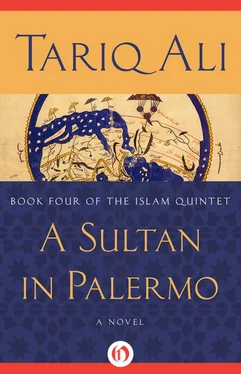‘Sultan, you speak of the desert people during the time of Ignorance, before our Prophet heard the voice of Allah. The women were brought under control by our faith.’
‘Perhaps in public, Master Idrisi, but in the confines of the palace or the home nothing much changed. Why, your own Prophet needed a Revelation to silence the scandalmongers who alleged that his young wife, Aisha, had committed adultery.’
Both men fell silent. It was Idrisi who spoke first. ‘You asked if on this island we might one day share a common faith. How can we ever believe that Mariam was impregnated by Allah to produce Isa? Your faith was too close to pagan times and you had to make compromises. You needed a virgin goddess who slept with your God. Was this not Zeus in another form? And we find it difficult to believe that Isa was resurrected.’
‘Why? Your book talks of the Day of Judgement where every man will face his creator. Some will go to Heaven and others to Hell. If they can be resurrected at Allah’s will, why couldn’t God recall Jesus? As you know, Idrisi, these are unsettled questions in our Church. There are many Christians who do not accept the divinity of Jesus. Are there any in your faith who question the Revelation?’
‘Too many, alas, and from the earliest times. The Prophet’s own wife, Aisha, according to traditions, commented many times on the ease with which her husband obtained sanction from Allah to satisfy his personal desires. And the Prophet’s successor Caliph Omar was heard to say that he was often surprised when the advice he had given the Prophet in private turned out to be exactly the same as a later Revelation. And a whole group of theologians in Baghdad argued that al-Quran was a man-made document, thus questioning its divinity…’
‘Enough for one evening, Master Idrisi. I readily admit that your religion permits far greater pleasures in this world and the next than does mine. For that reason alone, leaving aside the knowledge spread by your learned scholars, if it was up to me alone and nothing else was involved I would convert to your faith this very moment.’
‘Perhaps, if the ships bringing Your Majesty’s forebears to the land of the Gauls and Franks had been diverted by sudden squalls and had instead reached the ports of al-Andalus, all might have been different.’
‘Why did that not occur to me?’
‘Because geography and history are ever present in my thoughts.’
‘One thing I promise you, Master Idrisi. As long as I am alive the Church will not be allowed to kill or burn a single person simply because he believes in your Prophet and not mine.’
And that is how the conversation ended or so Idrisi had thought. But later that night, Philip al-Mahdia had visited him in his rooms.
‘I heard of the conversation you had with the Sultan today.’
Idrisi was stunned. How did he know?
‘It is legitimate for you to question, but it would be unwise of me to reply. All I will say is that you made a great mistake.’
‘In Allah’s name, what mistake? Why do you talk in this fashion?’
There was an undercurrent of anger in Philip’s voice. ‘When the Sultan declared that if it was up to him he would convert to your faith, why did you not suggest that he should do so, but not make it public? For the Church and the Barons he would be a Christian, but in private say the five obligatory prayers. Why did you not suggest that, Master Idrisi? Do you realise what an opportunity has been missed because of your thoughtlessness? You are so concerned with your own work that you have lost sight of the larger world.’
Idrisi was so astonished by this outburst that for a few moments he stared at Philip in silence. ‘I did not ask what you suggest for the simple reason that the thought did not enter my head. Rujari is a friend, but he is also the Sultan. It was not my place to suggest anything to him.’
‘One day,’ said Philip calmly, ‘our people might suffer because of your mistake.’
‘Why are you so concerned? You are not even a Believer.’
Philip smiled and left the room.
The trial of Philip. The Amir of Catania farts loudly during the prosecutor’s speech.
THE LARGE HALL WHERE the Sultan met his subjects once a month had been transformed. The throne remained on the elevated wooden platform, but the empty space in front was now crowded with wooden chairs and benches laid as a semi-circle. In the centre a platform had been prepared for the prisoners: in addition to Philip a few of those who worked for him had also been arrested and charged to create the impression of a conspiracy.
The Barons entered first, dressed in their regalia, their swords dangling from their waists, and took their seats on both sides of the throne. They were followed by other sections of the nobility and then the judges entered, flanked by the Bishops with several monks in attendance. The prosecuting judge was seated just below the Sultan’s throne. After they had all been seated, the Amirs of Catania and Siracusa, together with a handful of Muslim notables from Qurlun, Djirdjent, Shakka and Marsa Ali as well as the qadi of Palermo, were permitted to enter and seated on the benches at the back, where it would not be easy for the Sultan to see them.
The hall fell silent when the Chamberlain entered and announced the Sultan. For the occasion Rujari had discarded his Arab robes and, like his Barons, was dressed as a Christian knight, the crown resting firmly on his head. Everybody present rose to greet the King in three different languages. Rujari nodded and the trial began. The prisoners, chained to each other with Philip at their head, were brought into the hall. He walked in with his head raised high, prepared to meet the eyes of the Sultan or his Barons. It was they who averted their gaze. Ten eunuchs known to be close to him were charged with exactly the same offences. They, too, conducted themselves with dignity.
The prosecuting judge, who had once worked for Philip, rose and listed the charges. ‘Philip al-Mahdia, you and those creatures by your side are charged with having betrayed the trust placed in you by King Roger. You are accused of having aided our enemies in Mahdia and Bone in Ifriqiya. You are accused of having concealed your real faith from the King and his court. Beneath the cloak of a Christian you behaved like a child of Satan. In mind and deed you followed the doctrines of Muhammad and you instructed the State treasury to give unlimited amounts of money to maintain the mosques in good condition. You sent special emissaries with offerings to the tomb of Muhammad. When it was suggested that this money be registered in the records, you dismissed the suggestion with an arrogant wave of your hand.
‘You frequently attended the synagogues of the Evil Ones and provided them with oil to fill their lamps. You offered them all the assistance they needed to practise their abominable faith. At the same time you rarely set foot and even then unwillingly in the churches of God. You ostentatiously ate meat on Fridays and during Lent.
‘The King was alerted to your infidelity when it was reported to him how you had permitted Muslim scholars and pious men to flee to their villages after you had conquered Mahdia and Bone. It is reported that you punished some of your own soldiers when you saw them taking a few women prisoners for their personal enjoyment.
‘And lastly, Philip al-Mahdia, we will produce witnesses who will swear on al-Quran that you have been a secret Muslim all your life. Your conversion was false. What trust can the King put in you after all these events? You were brought up in this palace and the King loved you like a son. You rose to the highest position in the land after the King. And you have brought disgrace on him. What do you say to all this?’
Читать дальше












